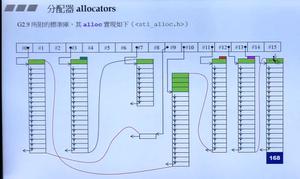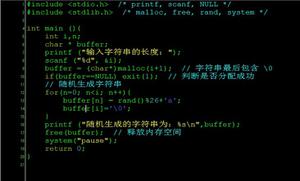为什么C ++要求对malloc()进行强制转换,但C不需要?
在C语言中,void指针被隐式转换为对象指针类型。该函数malloc()在C89标准中返回void *。在早期版本的C中,malloc()返回char *。在C ++语言中,默认情况下malloc()返回int值。因此,使用显式转换将指针转换为对象指针。
以下是使用C语言分配内存的语法。
pointer_name = malloc(size);
这里,
pointer_name-给指针的任何名称。
大小-以字节为单位分配的内存大小。
以下是malloc()C语言的示例。
示例
#include <stdio.h>#include <stdlib.h>
int main() {
int n = 4, i, *p, s = 0;
p = malloc(n * sizeof(int));
if(p == NULL) {
printf("\nError! memory not allocated.");
exit(0);
}
printf("\nEnter elements of array : ");
for(i = 0; i < n; ++i) {
scanf("%d", p + i);
s += *(p + i);
}
printf("\nSum : %d", s);
return 0;
}
输出结果
Enter elements of array : 2 28 12 32Sum : 74
在上面的C语言示例中,如果我们进行显式强制转换,则不会显示任何错误。
以下是使用C ++语言分配内存的语法。
pointer_name = (cast-type*) malloc(size);
这里,
pointer_name-给指针的任何名称。
cast- type-要通过其强制转换分配的内存的数据类型malloc()。
大小-以字节为单位分配的内存大小。
以下是malloc()C ++语言的示例。
示例
#include <iostream>using namespace std;
int main() {
int n = 4, i, *p, s = 0;
p = (int *)malloc(n * sizeof(int));
if(p == NULL) {
cout << "\nError! memory not allocated.";
exit(0);
}
cout << "\nEnter elements of array : ";
for(i = 0; i < n; ++i) {
cin >> (p + i);
s += *(p + i);
}
cout << "\nSum : ", s;
return 0;
}
输出结果
Enter elements of array : 28 65 3 8Sum : 104
在上面的C ++语言示例中,如果我们不进行显式转换,则程序将显示以下错误。
error: invalid conversion from ‘void*’ to ‘int*’ [-fpermissive]p = malloc(n * sizeof(int));
以上是 为什么C ++要求对malloc()进行强制转换,但C不需要? 的全部内容, 来源链接: utcz.com/z/327121.html





